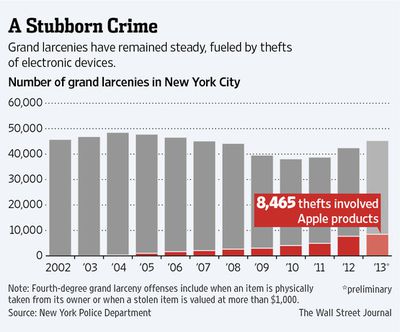According to new data from the New York Police Department (via The Wall Street Journal), the rising theft of devices such as the iPhone and iPad remained one of the driving forces behind the high amount of grand larcenies last year in New York City. In detail, the data showed that Apple products were involved in 8,465 thefts and made up for 18% of all grand larcenies in the city, which rose 13% overall in 2013 from the year prior.

Apple products are so popular among criminals that the NYPD specifically tracks thefts of that brand, officials said. In 2013, Apple products made up more than 18% of all grand larcenies—that is more than 8,000 devices, according to police. In 2002, there were 25 grand larcenies of Apple products, police said.
A spokeswoman for the company said Apple has "led the industry in helping customers protect their lost or stolen devices" since it launched its "Find My iPhone" app in 2009, which allows users to track a stolen phone and erase personal data remotely.
In 2012, former New York City mayor Michael Bloomberg released data showing that the theft of iPhones and iPads contributed to growth of the overall crime index for the city, as the police department recorded 3,890 more Apple product thefts than for the same period in 2011.
iPhone and iPad thefts continue to be a major issue for law enforcement, despite efforts to implement various theft deterrent programs. However, Apple's Activation Lock feature, which prevents stolen phones from being reactivated without an iCloud password, has received praise from various groups since its inclusion in iOS 7.
San Francisco district attorney George Gascón and New York Attorney General Eric Schneiderman, who have spearheaded anti-theft efforts, called Activation Lock the "world's first attempt to implement a technological solution to the global smartphone theft epidemic," while the police department distributed flyers near Apple Retail Stores encouraging users to download iOS 7.
The New York City Council also announced in November that it was considering a pawn shop bill that would require second hand dealers and pawn brokers to maintain easily accessible electronic records of purchased items, however the status of the bill is currently unknown. Notably, a national phone database established last year was found to be largely ineffective against smartphone thefts in the U.S., with law enforcement authorities even pressing smartphone manufacturers to build a kill switch into phones.























